Ultimate Guide to Dental Implant Recovery
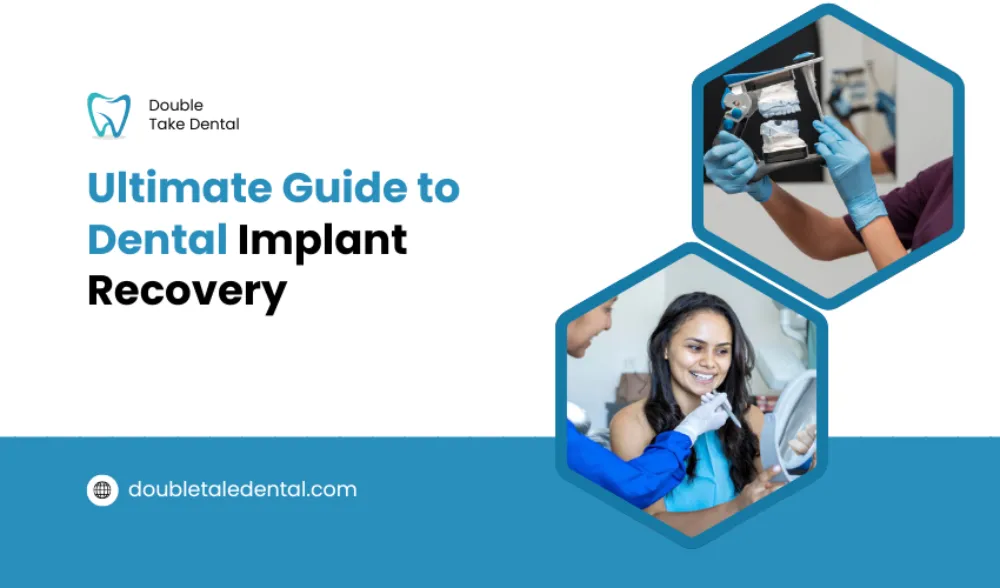
The American Academy of Implant Dentistry reports that more than 3 million Americans have dental implants to date, with the figure increasing by 500,000 each year.
And most of them undergoing this surgery are worried about the pain during the procedure, post-surgical care, and the duration of dental implant healing time.
In this guide, we will help you understand dental implant healing time and instruct you about long-term care to get better results.
What Are Dental Implants?
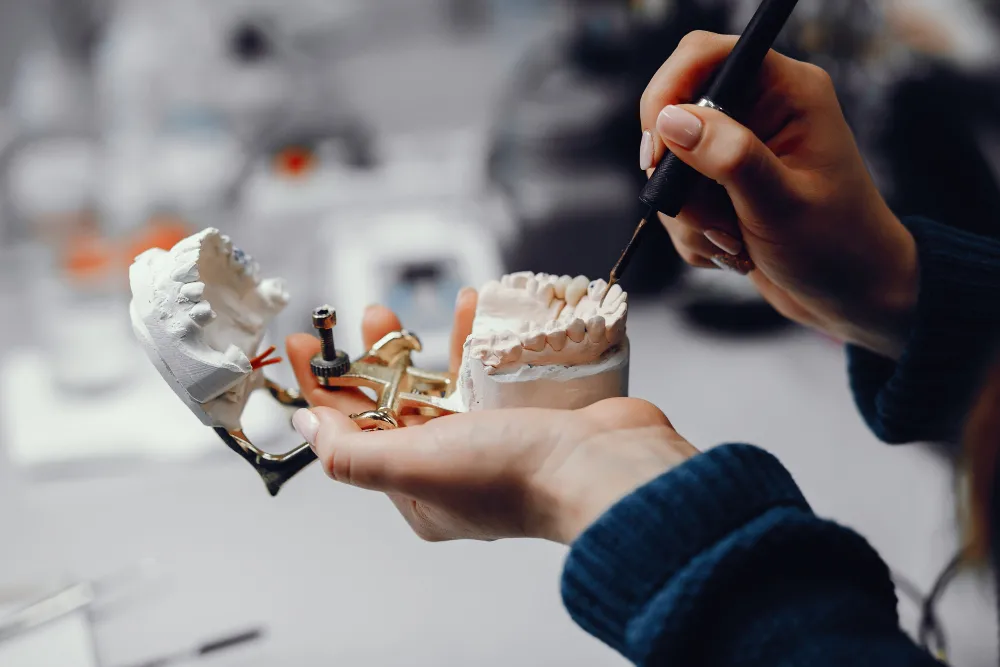
Dental implants are artificial teeth surgically inserted to replace natural teeth. These implants fuse with the natural jawbone and look like natural teeth. If you have lost or damaged your natural teeth in an accident, a dental implant is a way to restore your teeth.
Dental implants are typically composed of titanium or zirconia. Titanium is strong but lightweight and bonds well with bone. Zirconia is metal-free and looks more natural for front teeth.
What Happens Right After Implant Surgery
The initial 72 hours are crucial in your tooth implant recovery. Your body begins forming blood clots at the surgical sites, which protect the area and initiate tissue healing. Dislodging these clots can cause dry sockets or infections.
Due to this concern, manual workers should consider taking 3 to 5 days off depending on physical exertion. However, office workers may return in 1 to 2 days.
Managing Pain and Swelling
- Apply cold compresses in 20-minute intervals for the first two days.
- Use prescribed medications or over-the-counter pain relievers like ibuprofen (according to FDA guidance).
- Rest with your head raised to reduce swelling.
Dental Implants Recovery Time
Healing varies based on several factors. On average:
- Single-implant healing takes 1 to 3 months
- Full mouth implants need 3 to 6 months for healing
Your recovery time can be influenced by factors such as bone quality, your overall health, and whether bone grafting was performed before the implant. The CDC notes that conditions like diabetes and smoking can delay healing significantly. Always follow your dentist’s advice on the healing time for dental implants and when to return to work.
Week-by-Week Healing Stages
Full recovery from dental implants takes a few months. Here is a comprehensive view of how the healing process begins and continues.
Week 1: Protecting the Surgical Site
In the first week after surgery, your main goal is to protect the implant area. Choose soft foods and refrain from smoking or consuming alcohol. Avoid intense exercise, and use a soft-bristled toothbrush when cleaning your teeth. These small steps help prevent irritation and support early healing.
Weeks 2 to 4: Early Bone Fusion and Gum Healing
This is when gum tissues heal and early osseointegration begins. Signs of healthy healing include reduced swelling and increased comfort. However, watch for complications like prolonged bleeding, pus, or fever.
1 to 3 Months: Deep Healing and Osseointegration
Osseointegration is when your implant bonds with the jawbone. This biological process typically takes 8 to 12 weeks. During this time:
- A temporary crown is applied
- Regular follow-ups help monitor progress
This stage is critical for long-term success.
Placing the Permanent Crown or Bridge
After the implant has stabilized, your dentist will fit a permanent crown or bridge. This process may vary slightly for patients undergoing full-mouth restorations.
Permanent dental crowns are made from materials like porcelain, zirconia, metal alloys or porcelain fused to metal (PFM). Porcelain and zirconia look natural and match your tooth color. Metal crowns are very strong and are often used for back teeth.
Factors That Can Affect Your Recovery Time for a Tooth Implant
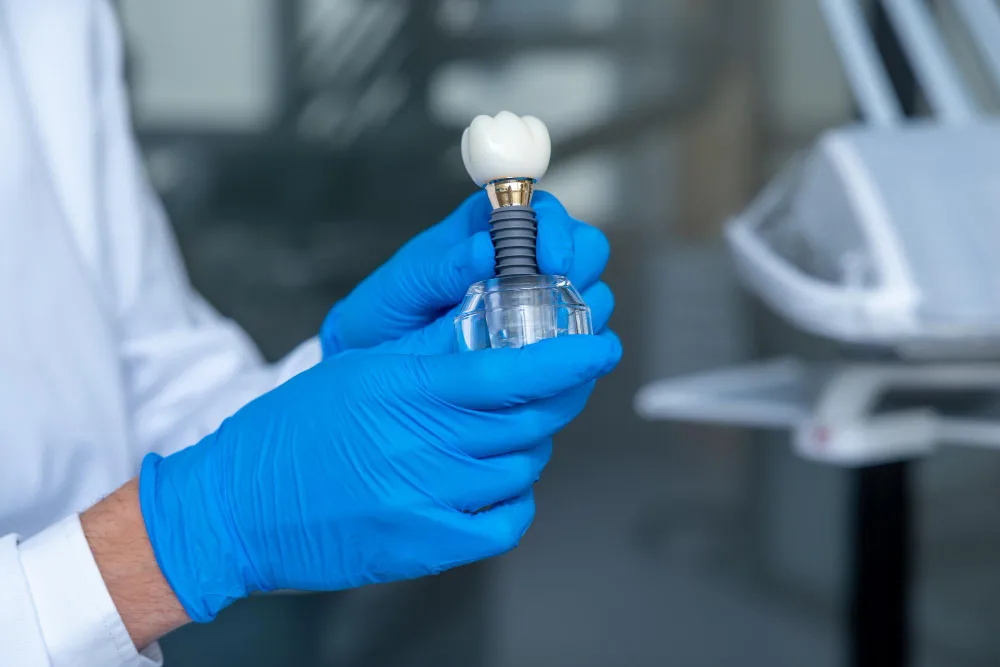
Several factors influence how long it takes to recover from dental implants. These factors include:
- Age and general health
- Bone density and grafting needs
- Number of implants placed
- Medication interactions
- Smoking and alcohol use
Foods to Eat & Avoid During Recovery
Eating the right foods after a dental implant can accelerate recovery and help prevent complications. Here’s what you should and should not eat during recovery.
Foods You Should Eat
Stick to soft, gentle foods that won’t stress the implant area:
- Blended soups
- Yogurt
- Scrambled eggs
- Protein shakes (no straw)
- Mashed potatoes
- Oatmeal or soft cereals
Foods to Avoid
Avoid foods that are hard, sticky, or irritating to the surgical site:
- Nuts and raw vegetables
- Chips and sticky candy
- Spicy or acidic foods
- Very hot drinks
- Popcorn
- Carbonated beverages
When to Call Your Dentist
Healing after dental implants is usually smooth, but complications can arise. Seek immediate care if you notice:
- Persistent or worsening pain
- Swelling beyond 3 days
- Fever over 101.5°F
- Bad taste or pus around the implant
Your dental provider can intervene early to prevent long-term issues.
Final Words
Recovering from dental implants is not a quick-healing process. It takes a few months for the fusion of your implanted teeth to your natural jawbone to occur. During the recovery process, your surgical site forms a blood clot and begins to heal.
A temporary crown is placed on the implanted teeth to ensure a smooth and secure healing procedure. After complete healing of 3 to 4 months, this crown is replaced with the permanent one.
To speed up recovery time, opt for soft food rich in protein and nutrients. Follow the instructions of your dentist. Avoid hard food and heavy exercises as they can remove the blood clot and leave your implant with a dry socket or continuous bleeding.
If you’re looking for dental implants, Double Take Dental is your go-to medical center. Our years of experience, premium treatment, and expert care have built trust with thousands of our patients.
Recent Posts

What Foods To Avoid After a Tooth Extraction & What to Eat
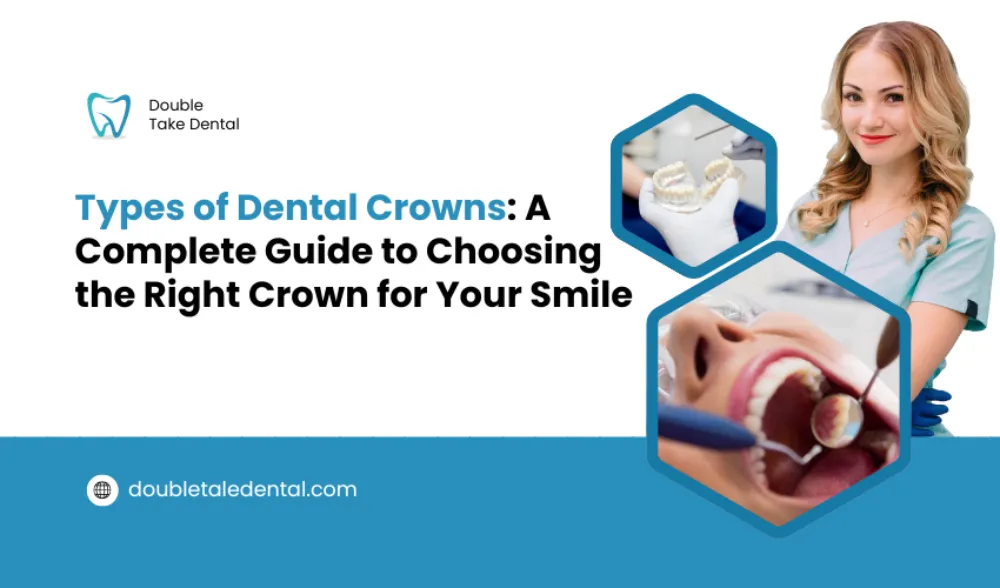
Types of Dental Crowns: A Complete Guide to Choosing the Right Crown for Your Smile
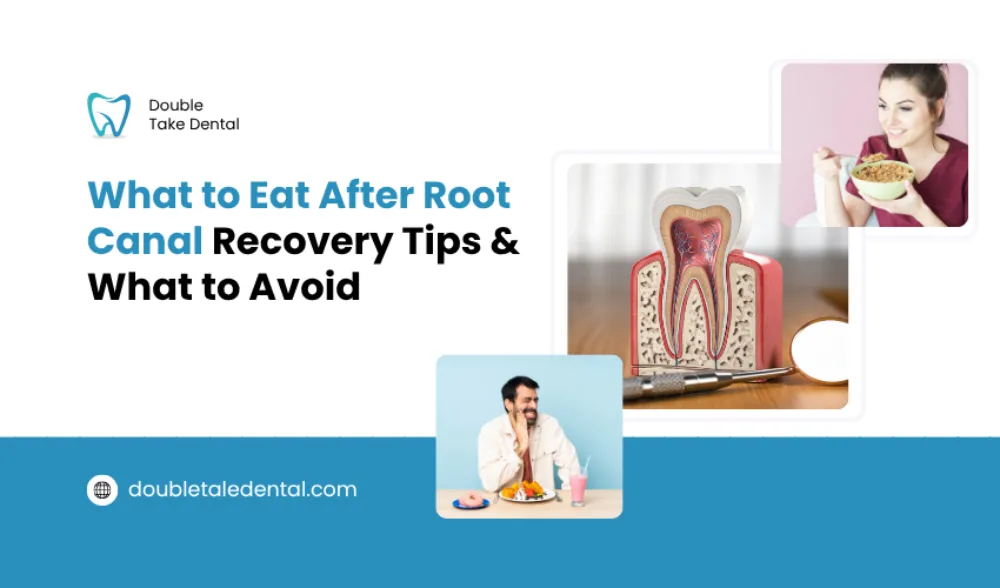
What to Eat After Root Canal: Recovery Tips & What to Avoid

